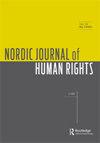人权多元普遍性:全球规范与文化多样性之间的桥梁
IF 1.2
Q3 POLITICAL SCIENCE
引用次数: 0
摘要
总的来说,国际法,特别是人权规范正经历着来自各个方面的批评浪潮。其中一个方面可以从关于人权普遍性和文化多样性的持续辩论中看出:人们对全球标准与地方特色之间的紧张关系越来越不满。本文建议重新发现1948年《世界人权宣言》起草者所设想的多元普遍性,作为一种解释工具,可以为这一困境提供指导。《宣言》起草者将普遍性理解为一套共同分享的价值观,这些价值观对于尊重人类尊严至关重要,但其内容是开放式的,足够灵活,可以容纳人类繁荣的各种概念。起草者通过横向跨文化协议、跨文化对话和在有争议的主题上接受合理的分歧来确定哪些概念具有普遍可接受性,哪些概念不具有普遍可接受性。文章建议,它们的普遍性概念和确定全球标准的方法可用于解决国际和国家领域之间的紧张关系,并加强人权制度的合法性。本文章由计算机程序翻译,如有差异,请以英文原文为准。
Human Rights Pluralistic Universality: A Bridge Between Global Norms and Cultural Diversity
ABSTRACT International law in general and human rights norms specifically are experiencing a wave of criticism from various fronts. One aspect of this is seen in the continuous debate on human rights universality and cultural diversity: there is growing discontent around tensions between global standards and local particularities. This article proposes to rediscover the pluralistic universality envisaged by the drafters of the Universal Declaration of Human Rights of 1948 as an interpretative tool that can provide guidance for this dilemma. The declaration’s drafters understood universality as a set of commonly shared values that are essential for the respect of human dignity, but the content of which is open-ended and flexible enough to entertain a variety of notions of human flourishment. The drafters determined which concepts enjoyed universal acceptability and which did not by looking at a horizontal cross-cultural agreement, intercultural dialogue, and accepting reasonable disagreement on controversial subjects. The article proposes that their concept of universality and method for determining global standards could be used to address the tensions between the international and national spheres and enhance the legitimacy of the human rights system.
求助全文
通过发布文献求助,成功后即可免费获取论文全文。
去求助
来源期刊

Nordic Journal of Human Rights
POLITICAL SCIENCE-
CiteScore
1.00
自引率
25.00%
发文量
29
期刊介绍:
The Nordic Journal of Human Rights is the Nordic countries’ leading forum for analyses, debate and information about human rights. The Journal’s aim is to provide a cutting-edge forum for international academic critique and analysis in the field of human rights. The Journal takes a broad view of human rights, and wishes to publish high quality and cross-disciplinary analyses and comments on the past, current and future status of human rights for profound collective reflection. It was first issued in 1982 and is published by the Norwegian Centre for Human Rights at the University of Oslo in collaboration with Nordic research centres for human rights.
 求助内容:
求助内容: 应助结果提醒方式:
应助结果提醒方式:


